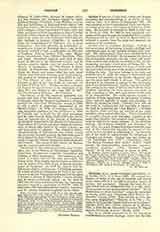

Carden (CARDANO, CARDANUS), GIROLAMO, Italian physician and mathematician, b. at Pavia, September 24, 1501; d. at Rome, September 21; 1576. He was educated at the Universities of Pavia and Padua, receiving at the latter the degree of Doctor of Medicine. He lectured on medicine at Milan in 1543 and at Pavia in 1544. In 1562 he was appointed professor at Bologna through the mediation of St. Charles Borromeo, and in 1571 he went to Rome where he received a pension from the pope and resumed the practice of his profession.
Cardan was an eccentric character. Perhaps it was on account of his leaning towards astrology and superstition that he was unjustly charged with atheism. His philosophical views were characteristic of the time in which he lived. He recognizes but three of the Aristotelean elements, viz, air, water, and earth, while warmth and moisture, according to him, are the energizing principles which give all things life. In man he distinguishes between the mens, or spirit, and the soul which is the seat of the sensitive faculties including the ratio. The latter belongs to the body and perishes with it, while the former is immaterial and Immortal and partakes of the Divine. Moreover, one and the same spirit dwells in all men. This spirit is destined to be elevated in ecstasy to the contemplation of the Divine Essence. Cardan also characterizes this ecstasy as the state of faith in which all the lower faculties, including the ratio, become quiescent, so that, according to him, faith and reason would seem to be incompatible. His whole system occupies a position of little importance in the history of philosophy, and led logically to magic and astrology, in which he became an adept. Cardan’s fame rests on his work in mathematics, and especially in algebra. In 1545 he published his “Ars Magna”, a treatise on algebra which contains the solution of the cubic equation, since named after him. This involved him in a lengthy dispute with Tartaglia. Cardan, it appears, had obtained the solution from Tartaglia, its original discoverer, under promise of the strictest secrecy. He however extended and developed it, and after his pupil Ferrari had discovered the solution of the biquadratic equation by means of the cubic, he felt justified in publishing it. In the preface of his work he acknowledges his obligations to Tartaglia and Ferrari. Cardan was also author of: “De Subtilitate libri XXI” (Nuremberg, 1550); “De Rerum Varietate libri XVII” (1557); “Opus novum de proportionibus numerorum, motuum, ponderum sonorum” (1570). Cardan’s “Opera Omnia” in 10 vols. appeared in Lyons in 1663.
H. M. BROCK

